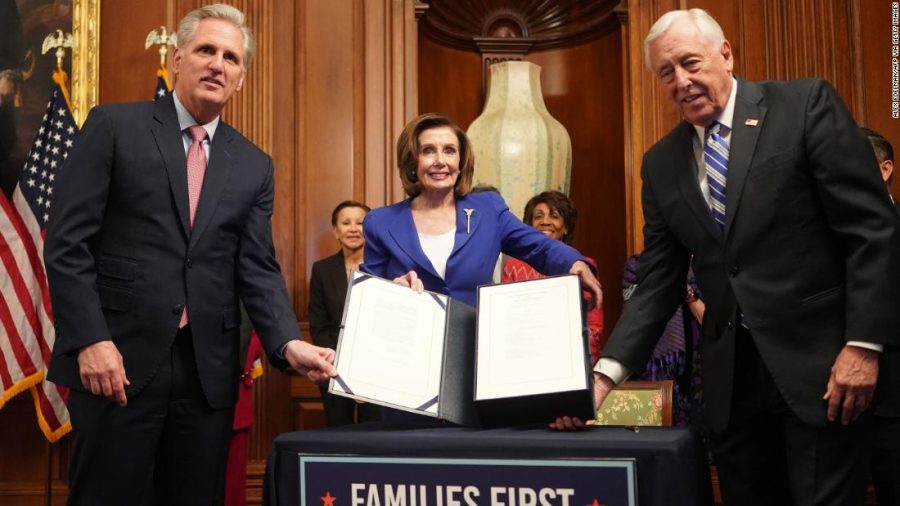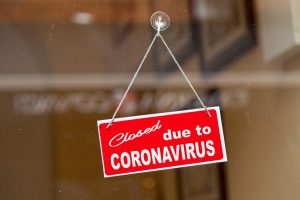Stimulus Package Signed into Action, as Number of Stay at Home Orders Grow
https://cdn.cnn.com/cnnnext/dam/assets/200327143205-01b-pelosi-bill-signing-0327-super-169.jpg
Speaker of the House Nancy Pelosi holds up the stimulus bill moments after being passed by the House.
April 7, 2020
In an attempt to combat the disastrous economic fallout of the ongoing COVID-19 pandemic, President Donald Trump recently signed a historically large $2.2 trillion stimulus package into action, after being passed by Congress on Friday, March 27.
The past month has forced the closure of many non-essential businesses, as well as diminished consumer activity to near record levels, pushing the market into a recession, and boasting unemployment patterns worse than the Great Depression. The giant stimulus package aims to relieve American workers, small businesses , and large industries during this time.
The package includes checks that will be sent directly to individuals and families, an increase in the benefits to those currently unemployed and those who file for unemployment, funds for hospitals and their workers, assistance to small businesses, and billions in loans for large companies and corporations.
For individuals and families, anyone earning up to $75,000 in gross (prior to tax deductions) income will receive a check for $1,200. Payments will scale down as gross income approaches $99,000, where one is no longer eligible to receive payment. For families, or joint filers, the payments and scale is doubled. Families, however, are paid $500 per qualifying child (children age 16 or under).
For most people, nothing needs to be done to receive their check. The government will use past tax returns to deposit the check into a known account. However, for others who are not required to file a tax return – such as: low income taxpayers, some senior citizens, Social Security recipients, and some disabled veterans – they will need to file a simple tax return to receive the payment, primarily to establish identity and provide routing information for a direct-deposit. Those who are behind on taxes will still receive the payment, however, are highly encouraged to catch up on their filings as soon as possible.
Senior Aidan Cooney was asked if he believes the government not providing assistance to those with gross income greater than $99,000 per filer was fair: “I think everyone affected by the current conditions, should all receive an opportunity to receive benefits from the government.”
When voting on the bill, one thing that kept the two parties far apart was how to handle assistance to distressed industries. Democrats worried that the funds would not be overlooked correctly, and assistance would not be given accordingly. Therefore, there is strict oversight on how the funds will be allocated to these industries.
In response to the fast spread of COVID-19, as cases seem to double every three days, many states such as New York, New Jersey, Connecticut, and now Maryland have issued stay at home orders. A stricter move forward from previous suggestions to practice social distancing and recommendations to stay home. Here in Maryland, citizens can even receive up to a $5,000 fine or up to a year in jail for violating the terms of the order.
Cooney was also asked whether he believes stay at home orders will do a better job at conveying the scale of the crisis to young people, which he claimed, “yes, when it’s an order put in place I think more people tend to take the situations of the time seriously.”
Many states are considering using the National Guard to assist in the efforts. Whether to help enforce keeping people home, or assist in providing medical care to patients. Use of the National Guard could be considered the next step in enforcing measures to limit the spread of the pandemic and provide care.
Senior Patrick Thomas, a future member of the National Guard, was asked for his perspective on deploying the National Guard to enforce these orders. He stated, “I think it’s the right action to take during time like this in order to slow down the spread of this crisis, especially in harder hit areas with denser populations.”






























